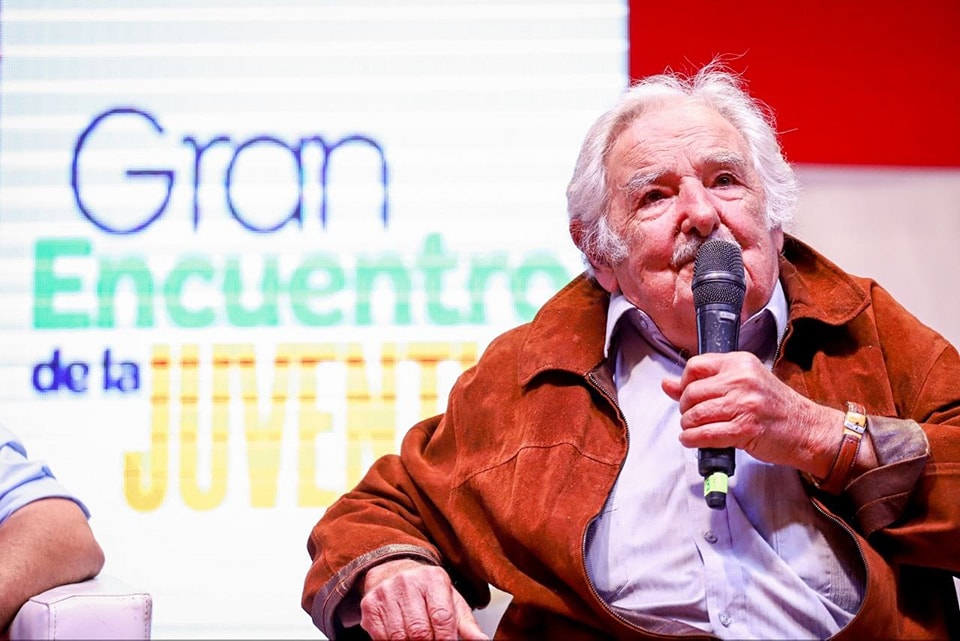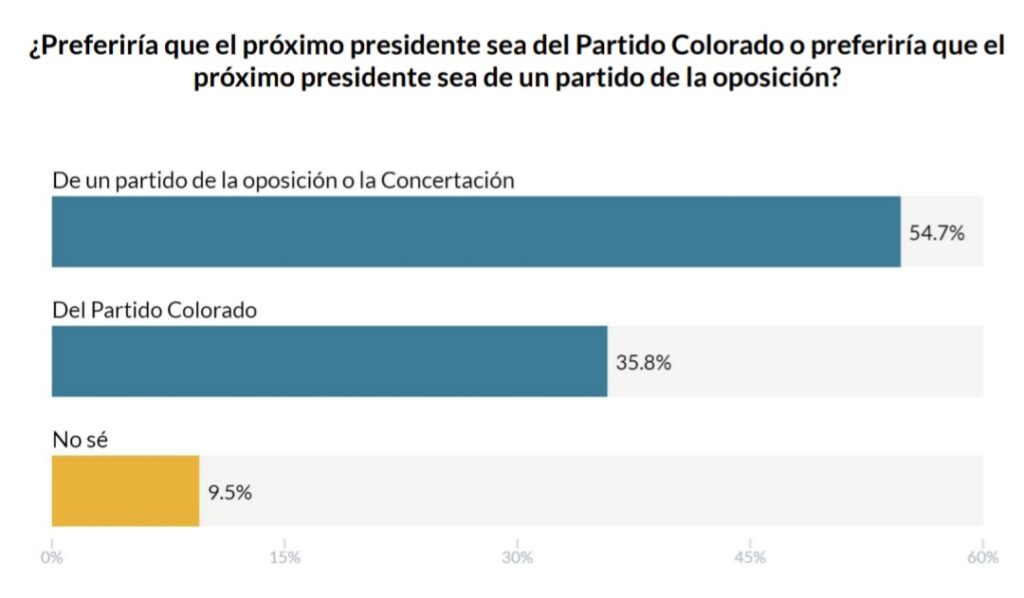
By Marcos Pérez Talia.
Last Saturday, April 15, the young people of the Concertación received the former Uruguayan president Pepe Mujica in a massive event. Far from being a mere motivational talk to the youth, it was, in fact, a political decalogue based on historical, theoretical and empirical arguments. The purpose of this article is to recover a couple of them in light of the upcoming general elections in Paraguay.
Next Sunday, April 30, Paraguayan democracy will hold its eighth general elections after the fall of the long-lived Stronist dictatorship (1954-89). Of the seven previous presidential elections, the Colorado Party (which had already sustained the dictatorship for thirty-five years) triumphed in six, thus adding thirty more years of government, now in democratic times. This is a small example of the resilience of coloradismo, criticizable of course from multiple fronts, but powerfully effective to remain in power.
Against this background, it seems obvious that the Paraguayan opposition has to unite in order to triumph against the Colorado Party. However, such opposition unity has not always materialized. The Paraguayan opposition, or rather the oppositions, are heterogeneous groups, differentiated not only by ideology but also by strategy and praxis. As we pointed out in another article, in some elections they ran separately (1989, 1993 and 2003), in others partially united (2008 and 2013) and in others very united (1998 and 2018).
Unity in spite of differences, in the end, is more powerful than division under the pretext of ideological purity. Exposing his own history, Mujica expressed that “I come from the traditional left that was 80 years old, but it did not bother anyone, it was a mere testimony. Even the right wing treated him well, it put a bit of folklore to the matter”.
Apart from the 2008 opposition triumph, which has its own specificities (such as Lugo’s leadership, the thriving liberal structure and the Lino Oviedo phenomenon that capitalized on the colorado division) the two best results of the opposition in percentage terms occurred in an environment of broad convergence: in 1998 and 2018, with 42.6 and 42.7 percentage points respectively. The following table illustrates the statistical data.
Table I. Main results of the seven presidential elections (1989-2018).
| Presidency | 1989 | 1993 | 1998 | 2003 | 2008 | 2013 | 2018 |
| Colorado Party | 74.3% | 39.9% | 53.8% | 37.1% | 30.6% | 45.8% | 46.4% |
| Liberal Party (in alliance 1998, 2008, 2013 and 2018) | 20% | 32.1% | 42.6% | 23.9% | 40.9% | 36.9% | 42.7% |
| Encuentro Nacional | 23.1% | 0.5% | |||||
| Patria Querida | 21.2% | 2.3% | 1.1% | ||||
| UNACE | 13.4% | 21.9% | 0.8% | ||||
| Frente Guasú | 3.3% | ||||||
| Avanza País | 5.8% |
Source: own elaboration based on TSJE data
For these elections of 2023, the legal figure that (a large part) of the opposition decided to use is the Concertación. It is a motley space of convergence that brings together broad and dissimilar forces such as an important part of the Frente Guasú, Patria Querida, Encuentro Nacional, Hagamos, the Federación Nacional Campesina, the Democrático Progresista Party, the febrerismo, Yo Creo from Alto Paraná and, of course, the historic Liberal Party, among so many other movements and parties. This unity is not only important because of a mere arithmetic sum of parties and movements, but also because of the emergence of new leaderships that can attract the sympathy of different segments of society. Such is the case of Soledad Núñez, Sebastián Villarejo, Miguel Prieto or Johanna Ortega; who come to reinforce the consolidated leadership of Efraín Alegre, Kattya González, Esperanza Martínez, etc.
Is so much heterogeneity of ideas, trajectories and worlds of belonging a risk? Last Saturday Pepe Mujica pointed out that “when there is a need for change, the most important thing is the objective. Peoples come together or succumb. When they do not have the capacity to come together to find a better destiny, they are condemned”.
“When you have to change, you have to come together.” seems to be an adage as seductive as it is convoluted. But is there really a spirit of change in the electorate? The only survey that seems to be effective in the region is the one recently published by Atlas Intel. Following its data, we see that, indeed, there is a strong will for change in Paraguay.
Figure I. Response on voter preferences, Atlas Intel Survey
 Fuente: Encuesta Atlas Intel, abril de 2023
Fuente: Encuesta Atlas Intel, abril de 2023
If coming together for the sake of change is the first commandment, there is another equally crucial one according to Mujica: once together… tolerate each other’s differences. The former president pointed out that: “we must learn to tolerate each other and combine things that are different, because we are not perfect and the world is not perfect… We must maintain diversity because society is diverse. All the contradictions in society will be reflected in different political criteria and points of view”.
Unlike the Uruguayan Frente Amplio to which Mujica belongs, which brings together multiple progressive and center-left parties and movements, the Paraguayan Concertación is much more diverse. In the same political space converge, for example, the Federación Nacional Campesina and Patria Querida. That is why here, in contrast to Uruguay’s Frente Amplio, the call for “tolerance” as a response to the “diversity” that characterizes society in general, and the Concertación in particular, is doubly fundamental.
As an example, the results of the 2013 elections showed how electoral politics fiercely penalizes coalition crises and breakdowns. The breakup of the Alianza Patriótica para el Cambio in 2012, after the impeachment of Lugo, was key for the return of the coloradismo to the government, as shown in the following table.
Table II. Main results of the 2013 presidential election
| Candidate | Party | Votes | Percentage |
| Horacio Cartes | ANR | 1.104.169 | 45.83% |
| Efraín Alegre | Alianza Paraguay Alegre | 889.451 | 36.92% |
| Mario Ferreiro | Avanza País | 141.716 | 5.88% |
| Anibal Carrillo | Frente Guasu | 79.573 | 3.30% |
| Miguel Carrizosa | Patria Querida | 27.026 | 1.12% |
Source: own elaboration based on TSJE data. Online access: https://tsje.gov.py/e2013/resultados-elecciones-2013.html
The sum of votes received by the candidates of the parties that made up the APC, such as Efraín Alegre (889,451), Mario Ferreiro (141,716) and Aníbal Carrillo (79,573) was slightly higher than the votes obtained by Horacio Cartes, but higher nonetheless. This arithmetical exercise, although it does not always occur in reality, can still serve to make an analytical point. If the forces that made up the APC went together, they could have added 1,110,740 votes and defeated the 1,104,169 votes of the Colorado Party. That shows that the breakup of the APC was a ruinous business for the Paraguayan opposition that governed between 2008 and 2013. Keeping the «united team» would have been a guarantee of success despite the economic power of Cartes and the, so to say, « good profile» that the tobacco grower showed at that time.
In another part of his speech, Pepe Mujica insisted again that “this path that you have started is the one that builds hope, and not the other one, which is to be atomized, each one in his own ranch, believing himself to be the center of the world. I am an old man who was a sectarian when I was young, like any other young man who believes that with four revealed truths we can change the world”.
Unity in spite of differences, in the end, is more powerful than division under the pretext of ideological purity. Exposing his own history, Mujica expressed that “I come from the traditional left that was 80 years old, but it did not bother anyone, it was a mere testimony. Even the right wing treated him well, it put a bit of folklore to the matter”.
In times of yearning for change, mere testimonies do not build alternatives, but prevent the realization of collective dreams. Only convergence, unity and tolerance, with all its contradictions, is the only possible path. As once said by an old wise man who understands a little about politics.
Cover image: Social networks of Efraín Alegre
